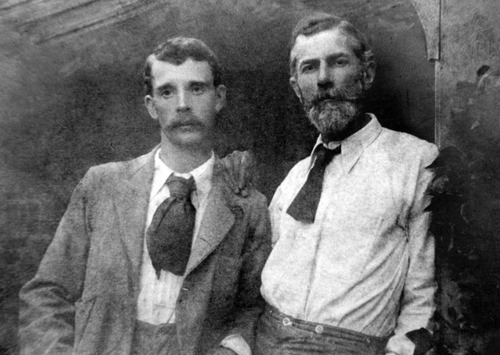Longtime companions
 |
| George Merrill & Edward Carpenter |
.
C’est lors d’une visite à son ami, le poète Edward Carpenter, dans le Derbyshire en 1912, que germe chez Forster son roman, Maurice. Carpenter et Merrill lui ont servi d’inspiration pour les personnages de Maurice et d'Alec Scudder.
“Sometimes the better you knew somebody, the more impossible any real talk became. That, at least, was how it felt to him. Here he was, in the home of the man he loved, on the other side of the world from his own constricting life, and what truths could be spoken between them? They talked about food, or the weather, or problems of justice, but they didn’t speak about anything that mattered. Everything was jest, or chatter, or deflection, and all the while the days were passing.
Of course, some important things were said, though more by accident than design.”
“He wanted to write in an altogether more positive, more uplifting way. He wanted to do everything, in imagination at least, that his life would otherwise not allow him. Above all, it would end in love. Two men from different classes would live together and love each other, in a sublime, suspended, fictional state.”
Morgan was stopping for a fortnight and on his last morning he asked whether his friend had had a chance to read it.
“Well, I glanced at it a little.” He pulled a face, which left no doubt about his feelings.
“You didn’t care for it.”
“Not much, to be honest. I’m not sure what you’re trying to prove, Morgan.”
“I’m not trying to prove anything, I’m sure. Just to, to… tell the truth, I suppose.”
“The truth? Well, perhaps there is some truth in it. What I don’t understand about your type is that you want to emulate the other side. You kick up such a commotion about being different, and all you want is to be the same.”
“To be treated the same. Is that so terrible?”
“Yes, it is, if you only knew it. What you want is to live with a man in a happy home. But you don’t know how trivial it is. Marriage is emblematic of modern life. The way men and women are together – it’s a silly business, it has no nobility. I wish you could see that, instead of romanticising it.”
“In the days that followed, the strongest residual feeling was sadness. There was no remorse. If he had only been able to take this step, he thought, at the normal age – when one was young, excited, eager – he might have had remorse and more happiness. But by now something had run its course in him; he was tied to a life of the spirit, a cold, lopsided, inward life, rather than the body. (Why did people believe it was only the flesh that binds?)
In any event, the hunger wasn’t satisfied. Even in one’s most physical moments, the real craving was for love.”
Damon Galgut - Arctic summer (Atlantic books-2014)
Commentaires
Enregistrer un commentaire
Si le post auquel vous réagissez a été publié il y a plus de 15 jours, votre commentaire n'apparaîtra pas immédiatement (les commentaires aux anciens posts sont modérés pour éviter les spams).